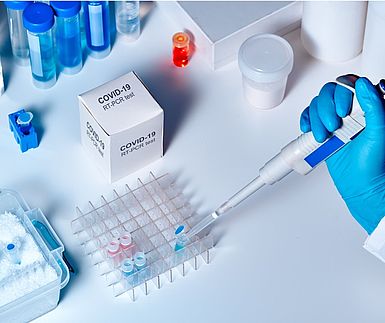Please type a search term (at least two characters)
News
TraceLabMed and EMPIR projects make vital contributions to COVID-19 testing

Viral testing
Testing for COVID-19 strongly relies on the ability of scientists to accurately and precisely measure nucleic acids like DNA and RNA. Members of EURAMET’s European Metrology Network for Traceability in Laboratory Medicine (EMN TraceLabMed) are taking part in several activities to aid the coronavirus pandemic response on a global level – where the current unprecedented health crisis has brought research around viral testing to the forefront of international metrology objectives.
EMPIR project ‘AntiMicroResist’
Led by the National Measurement Laboratory (NML) at LGC, a EURAMET EMPIR project (15HLT07, AntiMicroResist) has developed measurement capabilities and expertise to support the quality assurance provider INSTAND e. V..
INSTAND is a not-for-profit scientific medical society appointed by the German Medical Association to assess quality control within medical laboratories. Specifically, the project has helped to set up INSTAND’s new Proficiency Testing (PT) scheme to compare inter-laboratory methods for detecting the genome associated with SARS-CoV-2 (severe acute respiratory syndrome coronavirus 2).
This significant project outcome has been achieved through close collaboration of INSTAND with Prof Christian Drosten at the Institute of Virology of Charité in Berlin – where the institute in question is considered to be Germany’s national centre of excellence (formally, the Consultant Laboratory) in the field of coronavirus studies.
At present, the measurement laboratories of NML (UK), PTB (Germany) and NIST (USA) are providing continuing support for European testing by assigning values for virus quantification and evaluating material homogeneity, as well as offering metrology expertise for INSTAND’s new PT scheme.
The CCQM-NAWG study
The Consultative Committee for Amount of Substance (CCQM), within the BIPM, is responsible for developing and improving reference materials and methods for chemical and biological measurements. A working group of this committee, the CCQM Working Group for Nucleic Acid Analysis (CCQM-NAWG), has recently launched a fast-tracked inter-laboratory study for the measurement of the SARS-CoV-2 genome.
Coordinated by the aforementioned institutes, in addition to the NIM in China, the study will focus on measuring key genes that are targeted by SARS-CoV-2 diagnostic tests. More than 20 metrology institutes around the world, including several from the TraceLabMed network (such as PTB, INRIM and UME) are participating in the study to support the provision of standardised testing around the world.
EMPIR project ‘Bio-stand’
Another recently-completed EMPIR project (16SIP01, Bio-stand) for improved bioanalytical measurements has developed three new international ISO standards to support the counting of cells and monitoring of nucleic acids (see news story).
The project-developed standards successfully address measurement needs that have been identified by the biotechnology (ISO TC 276) and clinical diagnostics (ISO TC 212) communities. One of these standards has also been made freely available to support the development and implementation of effective COVID-19 viral testing.
Antibody testing
In addition to viral testing to detect the presence of the SARS-CoV-2 genome, the development of antibody tests is also essential to monitor the overall prevalence of the coronavirus. Importantly, antibody tests can assess the likely immunity of a given population to SARS-CoV-2, providing critical underpinning evidence to inform the direction of lockdown restrictions across the globe.
To maintain the robustness of antibody testing, several metrology institutes from EURAMET’s TraceLabMed network will participate in a pilot study - organised on behalf of the CCQM Working Group on Protein Analysis (CCQM-PAWG) by the NIM (China), BIPM (France), NIST (USA) and NRC (Canada). The study aims to validate measurement capabilities for antibody testing and to increase scientists’ understanding of the target epitope – the part of an antigen that is recognised by an individual antibody - using techniques such as the hydrogen-deuterium exchange.
More information
To find out more about recent developments in this area, please visit EURAMET’s new webpage on Traceability in Laboratory Medicine: the COVID-19 response.
You can also see NML’s webpage on COVID-19 standards and BIPM’s news story on COVID-19 diagnostic testing.
Want to hear more about EURAMET?
Sign up for EURAMET newsletters and other information
Follow us on LinkedIn and Twitter
Carbon dioxide, released from man-made activities, is lowering the pH of the Earth’s oceans, and impacting the health of marine organisms worldwide more
Supporting automated and reconfigurable manufacturing systems more
Working with external project Cool White to test and suggest improvements on the locally available white paints more
The project FutureEnergy has provided new calibration services for ultra-high voltages and a good practice guide on Lightning Impulse dividers more
For many of the 5000 photonics companies in Europe a precise knowledge of a material’s optical properties is vital for industrial competitiveness more





